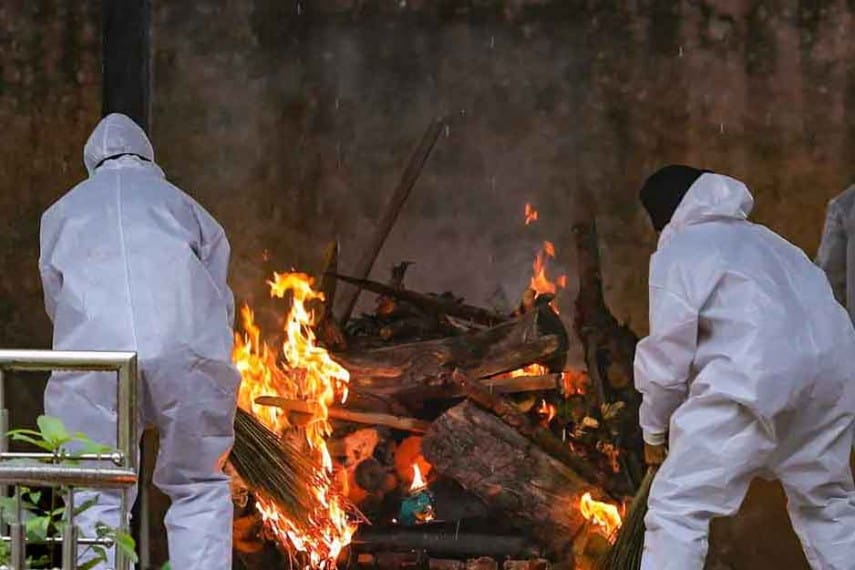Article, FEATURED STORIES, TRENDING, WORLD
Tragedy Grips India as COVID-19 Cases Reach New Records

A mass cremation of COVID-19 victims in New Delhi, India.
Overwhelmed hospitals in India are running out of beds and oxygen as the COVID-19 crisis ravages the world’s second most-populated country.
According to Johns Hopkins University, the nation broke its records for the highest number of deaths and new infections in a 24-hour period between Wednesday and Thursday. The country suffered 412,000 new cases and 3,980 deaths.
Medical facilities that are over capacity are turning patients back into the street for lack of resources, creating a full-blown humanitarian crisis. The surge seems to be the product of many problems: underinvestment in public health, a vaccine shortage in the country, a new deadly variant, lax lockdowns imposed by the Indian government, and even air pollution.
Prime Minister Narendra Modi’s administration now faces scrutiny as his people stand in the streets to watch cremations of loved ones on funeral pyres.
What caused the crisis in India?
India was an early model for the rest of the world in handling the virus. But as lockdowns relaxed, people flocked in mass to religious ceremonies and political rallies — a prevalent issue in the U.S. Now India is second in the world for coronavirus cases, just behind the U.S.
Unfortunately, India’s vaccine program is behind schedule, as supply constraints have restricted their ability to keep pace with the speed required to meet goals for collective vaccination.
Furthermore, studies have shown that exposure to air pollution may also be a factor in vulnerability to COVID-19. Many of India’s cities are smog-filled, and weather conditions like wind and humidity, common for the climate, exacerbate the air pollution’s health effects.
The government of India has laid blame on a “double mutant” variant of the virus which was first discovered in March. The variant has been linked to surges in several states. On the contrary, many blame the Indian government for poor pandemic planning.
Biden administration prepared to waiver US vaccine patent
In March, the “Quad Leaders” of the U.S., India, Japan, and Australia met and released a joint statement to address their cooperation in global health. Regarding vaccine availability, the leaders wrote:
“Building on the progress our countries have achieved on health security, we will join forces to expand safe, affordable, and effective vaccine production and equitable access, to speed economic recovery and benefit global health. With steadfast commitment to the health and safety of our own people, we also recognize that none of us can be safe as long as the pandemic continues to spread.”
This week it was announced that the U.S. is committed to a temporary waiver of patent rights for COVID-19 vaccines. This shows President Biden’s interest in getting the U.S. involved in the effort to get the world vaccinated.
Noravax Inc. announced on Thursday that it will begin shipping vaccines to India in the third quarter of 2021. The company is prepared to manufacture and provide 350 million shots. This is part of the COVAX program global effort for which Noravax Inc. has agreed to deliver 1.1 billion shots globally.
The Noravax shot is not authorized for use yet, but trial data shows it to be highly effective. Unfortunately, there are other obstacles, like supplies of materials used in making vaccines, that could prevent rapid enough creation of supply to help India and other countries in catching up with goals.
Vaccinated doctor dies after contracting coronavirus while in India
An infectious disease expert from Rutgers University, Dr Rajendra Kapila, died in New Delhi hospital on April 28. His wife reported that he had received both doses of the Pfozer-BioNtech vaccine before travelling to India to help care for ailing family members.
Kapila was 81 and had underlying health conditions that may have left him vulnerable, though fully vaccinated. He died after a 20 day hospitalization.
Colleagues called Kapila a “genuine giant in the field of infectious disease” with legendary knowledge.”

